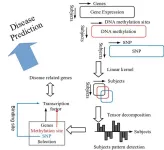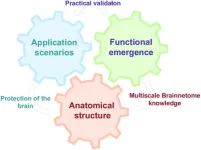(Press-News.org) At a glance:
New AI tool called EVEscape uses evolutionary and biological information to predict how a virus could change to escape the immune system.
The tool successfully predicted the most concerning new variants that occurred during the COVID-19 pandemic.
Researchers say the tool can help inform the development of vaccines and therapies for SARS-CoV-2 and other rapidly mutating viruses.
The COVID-19 pandemic seemed like a never-ending parade of SARS-CoV-2 variants, each equipped with new ways to evade the immune system, leaving the world bracing for what would come next.
But what if there were a way to make predictions about new viral variants before they actually emerge?
A new artificial intelligence tool named EVEscape, developed by researchers at Harvard Medical School and the University of Oxford, can do just that.
The tool has two elements: A model of evolutionary sequences that predicts changes that can occur to a virus, and detailed biological and structural information about the virus. Together, they allow EVEscape to make predictions about the variants most likely to occur as the virus evolves.
In a study published Oct. 11 in Nature, the researchers show that had it been deployed at the start of the COVID-19 pandemic, EVEscape would have predicted the most frequent mutations and identified the most concerning variants for SARS-CoV-2. The tool also made accurate predictions about other viruses, including HIV and influenza.
The researchers are now using EVEscape to look ahead at SARS-CoV-2 and predict future variants of concern; every two weeks, they release a ranking of new variants. Eventually, this information could help scientists develop more effective vaccines and therapies. The team is also broadening the work to include more viruses.
“We want to know if we can anticipate the variation in viruses and forecast new variants — because if we can, that’s going to be extremely important for designing vaccines and therapies,” said senior author Debora Marks, associate professor of systems biology in the Blavatnik Institute at HMS.
From EVE to EVEscape
The researchers first developed EVE, short for evolutionary model of variant effect, in a different context: gene mutations that cause human diseases. The core of EVE is a generative model that learns to predict the functionality of proteins based on large-scale evolutionary data across species.
In a previous study, EVE allowed researchers to discern disease-causing from benign mutations in genes linked to various conditions, including cancers and heart rhythm disorders.
“You can use these generative models to learn amazing things from evolutionary information — the data have hidden secrets that you can reveal,” Marks said.
As the COVID-19 pandemic hit and progressed, the world was caught off guard by SARS-CoV-2’s impressive ability to evolve. The virus kept morphing, changing its structure in ways subtle and substantial to slip past vaccines and therapies designed to defeat it.
“We underestimate the ability of things to mutate when they’re under pressure and have a large population in which to do so,” Marks said. “Viruses are flexible — it’s almost like they’ve evolved to evolve.”
Watching the pandemic unfold, Marks and her team saw an opportunity to help: They rebuilt EVE into a new tool called EVEscape for the purpose of predicting viral variants.
They took the generative model from EVE — which can predict mutations in viral proteins that won’t interfere with the virus’s function — and added biological and structural details about the virus, including information about regions most easily targeted by the immune system.
“We’re taking biological information about how the immune system works and layering it on our learnings from the broader evolutionary history of the virus,” explained co-lead author Nicole Thadani, a former research fellow in the Marks lab.
Such an approach, Marks emphasized, means that EVEscape has a flexible framework that can be easily adapted to any virus.
Turning back the clock
In the new study, the team turned the clock back to January 2020, just before the COVID-19 pandemic started. Then they asked EVEscape to predict what would happen with SARS-CoV-2.
“It’s as if you have a time machine. You go back to day one, and you say, I only have that data, what am I going to say is happening?” Marks said.
EVEscape predicted which SARS-CoV-2 mutations would occur during the pandemic with accuracy similar to this of experimental approaches that test the virus’s ability to bind to antibodies made by the immune system. EVEscape outperformed experimental approaches in predicting which of those mutations would be most prevalent. More importantly, EVEscape could make its predictions more quickly and efficiently than lab-based testing since it didn’t need to wait for relevant antibodies to arise in the population and become available for testing.
Additionally, EVEscape predicted which antibody-based therapies would lose their efficacy as the pandemic progressed and the virus developed mutations to escape these treatments.
The tool was also able to sift through the tens of thousands of new SARS-CoV-2 variants produced each week and identify the ones most likely to become problematic.
“By rapidly determining the threat level of new variants, we can help inform earlier public health decisions,” said co-lead author Sarah Gurev, a graduate student in the Marks lab from the Electrical Engineering and Computer Science program at MIT.
In a final step, the team demonstrated that EVEscape could be generalized to other common viruses, including HIV and influenza.
Designing mutation-proof vaccines and therapies
The team is now applying EVEscape to SARS-CoV-2 in real time, using all of the information available to make predictions about how it might evolve next.
The researchers publish a biweekly ranking of new SARS-CoV-2 variants on their website and share this information with entities such as the World Health Organization. The complete code for EVEscape is also freely available online.
They are also testing EVEscape on understudied viruses such as Lassa and Nipah, two pathogens of pandemic potential for which relatively little information exists.
Such less-studied viruses can have a huge impact on human health across the globe, the researchers noted.
Another important application of EVEscape would be to evaluate vaccines and therapies against current and future viral variants. The ability to do so can help scientists design treatments that are able to withstand the escape mechanisms a virus acquires.
“Historically, vaccine and therapeutic design has been retrospective, slow, and tied to the exact sequences known about a given virus,” Thadani said.
Noor Youssef, a research fellow in the Marks lab, added, “We want to figure out how we can actually design vaccines and therapies that are future-proof.”
Authorship, funding, disclosures
Additional authors on the paper include Pascal Notin, Nathan Rollins, Daniel Ritter, Chris Sander, and Yarin Gal.
Funding for the research was provided by the National Institutes of Health (GM141007-01A1), the Coalition for Epidemic Preparedness Innovations, the Chan Zuckerberg Initiative, GSK, the UK Engineering and Physical Sciences Research Council, and the Alan Turing Institute.
Marks is an advisor for Dyno Therapeutics, Octant, Jura Bio, Tectonic Therapeutic, and Genentech, and is a co-founder of Seismic Therapeutic. Sander is an advisor for CytoReason Ltd.
END
An AI tool that can help forecast viral outbreaks
EVEscape predicts future viral mutations, new variants using evolutionary, biological information
2023-10-11
ELSE PRESS RELEASES FROM THIS DATE:
Doubling down on known protein families
2023-10-11
Imagine researchers exploring a dark room with a flashlight, only able to clearly identify what falls within that single beam. When it comes to microbial communities, scientists have historically been unable to see beyond the beam — worse, they didn’t even know how big the room is.
A new study published online October 11, 2023 in Nature highlights the vast array of functional diversity of microbes through a novel approach to better understand microbial communities by looking at protein function within them. The work was led by a team of scientists at the U.S. Department of Energy ...
Detection and extraction of similar features in the disease-related gene groups
2023-10-11
【Research Study】
1. Background
Multiomics3 analysis that integrates different layers of profiles altogether is challenging, since the number of variables in profile substantially differ from each other. For instance, gene expression profile and genomic DNA methylation profile are often analyzed together, however, there are only tens of thousands of genes, whereas the number of DNA methylation sites are as many as tens of millions. The numbers differ one thousand times and the number ...
Omega-3 discovery moves us closer to 'precision nutrition' for better health
2023-10-11
University of Virginia School of Medicine researchers have obtained new insights into how African-American and Hispanic-American people’s genes influence their ability to use Omega-3 and Omega-6 fatty acids for good health. The findings are an important step toward “precision nutrition” – where a diet tailored to exactly what our bodies need can help us live longer, healthier lives.
Omega-3 and Omega-6 are “healthy fats.” We can get them from foods, but many people also take ...
Genalive earns CAP accreditation to raise the bar for clinical standards in Saudi Arabia
2023-10-11
Genalive, a leading clinical laboratory in Saudi Arabia, has passed an audit organized by the College of American Clinical Pathologists (CAP), demonstrating its excellence in clinical laboratory testing and management practices.
Genalive officially opened in June 2023, equipped with high-throughput sequencing platforms, advanced bioinformatics pipelines, AI-driven analytical tools and staffed by a team of experienced medical professionals and technicians. Genalive is a joint venture between BGI Almanahil Health for Medical Services, a wholly owned subsidiary of BGI Genomics, and Tibbiyah Holding, a renowned Saudi healthcare ...
Gene discoveries could help prevent deadly coronary artery disease
2023-10-11
An international team of scientists has identified nearly a dozen genes that contribute to calcium buildup in our coronary arteries that can lead to life-threatening coronary artery disease, a condition responsible for up to one in four deaths in the United States. Doctors may be able to target these genes with existing medications – or possibly even nutritional supplements – to slow or halt the disease’s progression.
“By sharing valuable genotype and phenotype datasets collected over many years, our team was able to uncover new genes that may foreshadow clinical coronary artery disease,” said researcher Clint L. Miller, PhD, of ...
Journal honors pioneering scientist with new series
2023-10-11
While scientific advances are made daily, foundational breakthroughs are rare and require exceptional researchers with unique points of view and questions, plus the necessary means to explore those ideas. One such researcher, Harold H. Flor, became a seminal figure in the study of plant pathology after developing the gene-for-gene concept in the mid-1900s. The gene-for-gene concept (namely, for each gene governing the host response, there is a corresponding gene in the pathogen) still stands as one of the most significant contributions to plant pathology—forever changing how scientists approach plant-microbe interactions and, more specifically, the molecular mechanisms ...
SwRI selected for $1.5 million DOE grant to evaluate compressor system for hydrogen-natural gas blends
2023-10-11
SAN ANTONIO — October 11, 2023 —Southwest Research Institute has been selected to receive a $1.5 million contract from the U.S Department of Energy to evaluate the safety and efficiency of a full-scale compressor system for hydrogen-natural gas blends containing up to 20 percent hydrogen by volume. SwRI will collaborate with the Gas Machinery Research Council (GMRC) on this project.
“Hydrogen has been recognized as a viable alternative to natural gas fuel,” said SwRI Senior Research Analyst Sarah Simons. “However, a pure hydrogen stream is not compatible with existing energy transport infrastructure because hydrogen and natural gas have ...
Researchers plot a course for building a “digital twin” of the brain
2023-10-11
Recent developments in neuroscience and brain-inspired artificial intelligence have opened up new possibilities in understanding intelligence. Now, a research team led by Tianzi Jiang at the Institute of Automation of the Chinese Academy of Sciences has outlined the key components and properties of an innovative platform called the Digital Twin Brain, which could bridge the gap between biological and artificial intelligence and provide new insights into both. This research was published Sept. 22 in Intelligent Computing, a Science Partner Journal.
Network structure is something that biological and artificial intelligence have in common. Since the brain consists ...
New research unveils intricate mechanism behind immune system’s ability to differentiate between self and non-self antigens
2023-10-11
A groundbreaking study, led by Professor Kyemyung Park and his research team in the Graduate School of Health Science and Technology and the Department of Biomedical Engineering at UNIST has shed light on the intricate mechanism behind the immune system’s ability to differentiate between self and non-self antigens. Their research, published in the esteemed journal Trends in Immunology, presents a novel quantitative framework that could pave the way for predictive models in immune-related disease treatment response.
The immune system is a complex network of cells and molecules that defends ...
Is less more? Or is less sometimes less? Examining the consumer trend toward minimalist packaging in consumable products
2023-10-11
Researchers from Texas Christian University, University of Illinois Urbana-Champaign, and University of Georgia published a new Journal of Marketing article that examines the consumer trend towards minimalist packaging in consumable products.
The study, forthcoming in the Journal of Marketing, is titled “Symbolically Simple: How Simple Packaging Design Influences Willingness to Pay for Consumable Products” and is authored by Lan Anh N. Ton, Rosanna K. Smith, and Julio Sevilla.
Designing products is both an ...
LAST 30 PRESS RELEASES:
A shift from the sandlot to the travel team for youth sports
Hair-width LEDs could replace lasers
The hidden infections that refuse to go away: how household practices can stop deadly diseases
Ochsner MD Anderson uses groundbreaking TIL therapy to treat advanced melanoma in adults
A heatshield for ‘never-wet’ surfaces: Rice engineering team repels even near-boiling water with low-cost, scalable coating
Skills from being a birder may change—and benefit—your brain
Waterloo researchers turning plastic waste into vinegar
Measuring the expansion of the universe with cosmic fireworks
How horses whinny: Whistling while singing
US newborn hepatitis B virus vaccination rates
When influencers raise a glass, young viewers want to join them
Exposure to alcohol-related social media content and desire to drink among young adults
Access to dialysis facilities in socioeconomically advantaged and disadvantaged communities
Dietary patterns and indicators of cognitive function
New study shows dry powder inhalers can improve patient outcomes and lower environmental impact
Plant hormone therapy could improve global food security
A new Johns Hopkins Medicine study finds sex and menopause-based differences in presentation of early Lyme disease
Students run ‘bee hotels’ across Canada - DNA reveals who’s checking in
SwRI grows capacity to support manufacture of antidotes to combat nerve agent, pesticide exposure in the U.S.
University of Miami business technology department ranked No. 1 in the nation for research productivity
Researchers build ultra-efficient optical sensors shrinking light to a chip
Why laws named after tragedies win public support
Missing geomagnetic reversals in the geomagnetic reversal history
EPA criminal sanctions align with a county’s wealth, not pollution
“Instead of humans, robots”: fully automated catalyst testing technology developed
Lehigh and Rice universities partner with global industry leaders to revolutionize catastrophe modeling
Engineers sharpen gene-editing tools to target cystic fibrosis
Pets can help older adults’ health & well-being, but may strain budgets too
First evidence of WHO ‘critical priority’ fungal pathogen becoming more deadly when co-infected with tuberculosis
World-first safety guide for public use of AI health chatbots
[Press-News.org] An AI tool that can help forecast viral outbreaksEVEscape predicts future viral mutations, new variants using evolutionary, biological information







